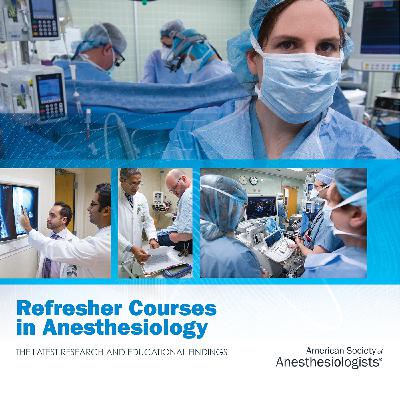Discover Refresher Courses in Anesthesiology
Refresher Courses in Anesthesiology

Refresher Courses in Anesthesiology
Author: American Society of Anesthesiologists
Subscribed: 41Played: 1,248Subscribe
Share
© American Society of Anesthesiologists
Description
This online program includes peer-reviewed lectures selected from the ASA Refresher Courses presented at ANESTHESIOLOGY® Annual Meeting. Each module contains the author’s manuscript, a pre-test and post-test. Plus, select modules contain author interviews in a podcast format.
18 Episodes
Reverse
This refresher course will discuss the safety and efficacy of regional anesthesia including US guidance and discuss an evidence based approach to utilization of blocks in children.
Anesthesiologists deliver pediatric sedation in a range of locations outside the operating room. In those sites, the staff, monitors and drugs vary, which may challenge the safe delivery of sedation. We must be aware of the challenges to providing safe delivery of sedation and how to preclude their impact on sedation.
This lecture summarizes various multi-modalanalgesic options to optimize pain management post-cesarean delivery. The role of neuraxialopioids, non-steroidal anti-inflammatories, acetaminophen, gabapentin, wound infiltration, transversus abdominis plane block, and future analgesic options will be reviewed. Analgesic drug exposure in breastfeeding neonates, and techniques to minimize the transfer of analgesics into breast milk will also be discussed.
With the increasing use of IEDs by terrorists in the US it is important that anesthesiologists have knowledge of how to manage casualties should they present at their hospital. This RCL will review the basics of IEDs, the types of injuries caused by IEDs, and what anesthesiologists should anticipate when managing casualties. The principles of managing these casualties are readily adaptable to managing casualties in a mass casualty situation.
This presentation will focus on Physician-Focused Alternative Payment Models (PFPMs) created under the MACRA legislation from a multi-specialty perspective and help anesthesiologists identify trends and opportunities in their communities.
This refresher course lecture will review the incidence, risk factors and mechanisms of perioperative nerve injury, with a special emphasis on the use of electro-diagnostic testing and other imaging studies to guide prognosis and treatment, including surgical reconstructive options. Medical legal risk mitigation strategies will be discussed, along with a review of best practices to prevent inadvertent nerve injection injuries.
Emergency manuals are context-relevant sets of cognitive aids, such as crisis checklists, in this case for perioperative or procedural contexts. The framework for this RC is Why, When, and How emergency manuals can help clinical teams to deliver best practices to patients during critical events. Rationale for why to implement and use emergency manuals will be presented, drawing from high stakes industries and human factors, as well as simulation-based healthcare studies. Vital elements for effective implementation and use will be presented. Potential challenges and pitfalls will be explored, and facilitators of successful implementation and use will be described.
This refresher course lecture will provide the information required to safely anesthetize the pregnant patient presenting for non obstetric surgery. The physiologic changes of pregnancy and how it impacts on the mother, as well as the concepts of teratogenicity and apoptosis as it relates to the developing fetus will be discussed. An anesthetic plan for safely anesthetizing the mother will be presented.
This course will discuss infectious agents that pose a risk to the Anesthesiologist. Within this discussion a review of protective gear will also be covered and methods to minimize risk.
This refresher course will focus in depth on the clinical challenge of providing lung isolation (= lung separation) for cases requiring one-lung anesthesia. It will begin with a conceptual framework and emphasize relevant anatomy, techniques, and devices used to reliably achieve lung isolation. (Ventilation will not be covered.)
Using Game Changer article selection, the clinician will organize critical articles as they relate to their own clinical practice.
This refresher course lecture will focus on health policy and coverage changes affecting interventional pain physicians. Participants will review these changes and how they are impacting (or will impact) pain medicine physicians. New and upcoming coding changes will also be presented. Finally, various methods of reporting with HR2 (MACRA) implementation will be discussed.
This refresher course lecture will address the broad topic of perioperative stroke. The speaker will discuss the epidemiology and known risk factors for perioperative ischemic stroke as well as the identification and management of patients suspected of having a stroke in the perioperative setting.
Most routine pediatric surgical procedures are considered appropriate for ambulatory surgery. However, certain patient/procedure combinations may not be suitable for freestanding ASCs where prolonged recovery or the frequent need for overnight observation may be encountered. Examples such as the obese child with severe OSA, the very young infant with history of prematurity or the child with moderately severe asthma will be discussed. A workable preoperative screening process including education of surgeons will be presented.
Creation of an Institutional Program to optimize glucose control across the surgical experience.
This refresher course reports current findings from the Anesthesia Closed Claims Project and reviews recent papers including difficult intubation, respiratory depression associated with acute pain management, management of unexpected hemorrhage, and safety concerns in non-operating room anesthesia. Current practice guidelines and communication and systems changes to improve perioperative patient safety will also be discussed.
This refresher course lecture will provide a comprehensive overview of current research in the field of perioperative delirium. The lecture will cover assessment techniques for delirium, prevalence of perioperative delirium, and outcomes associated with perioperative delirium. Furthermore, studies of risk factors, prevention strategies, and treatment regimens will be discussed, including important limitations and ongoing questions in perioperative delirium research.
Airway management is our specialty's defining technical skill, but its practice is largely unchanged for the past 70 years. Failed direct laryngoscopy is common, often unanticipated and repeated attempts are unlikely to produce different outcomes. Can newer techniques and management strategies provide safer patient care? We will explore some of the strategies and techniques appropriate to this situation and measures appropriate to prevent a recurrence.





